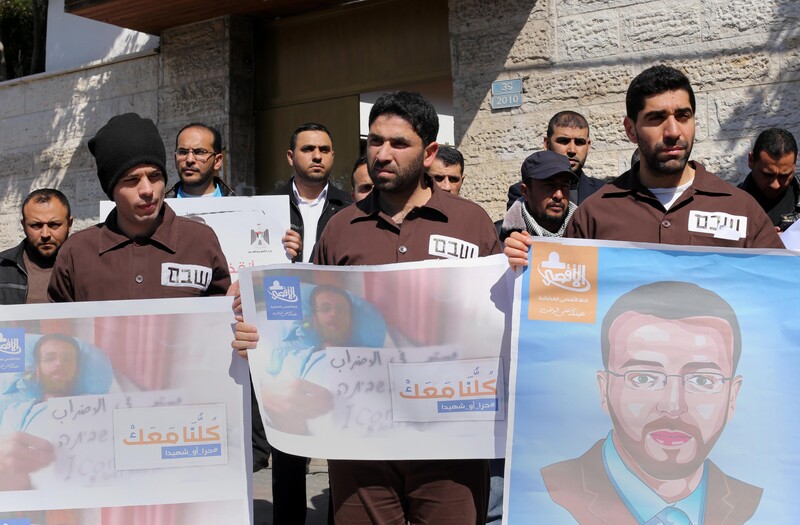Rights and Accountability 24 February 2016

Palestinian journalists wearing mock Israeli prison uniforms hold a rally in solidarity with their hunger-striking colleague Muhammad al-Qiq, in Gaza City on 24 February.
APA imagesMuhammad al-Qiq’s body has collapsed and his heart rate has slowed, lawyers report, as the 33-year-old Palestinian journalist and father of two enters day 92 of his hunger strike against his detention by Israel without charge or trial.
Meanwhile, Israel is still refusing to allow al-Qiq’s wife Fayha Shalash and their two young children to be with him during what is feared may be his final hours.
On Tuesday, Shalash spoke by telephone from the occupied West Bank to a solidarity rally for her husband in the Mauritanian capital Nouakchott.
“Muhammad al-Qiq did not go on strike to harm himself or to hurt his two children who wait for him minute by minute, but rather to tell the Israelis: our decision is to live free or to die with dignity,” Shalash said.
“This is the message of every Palestinian to the world,” Shalash added.
No negotiations
Since Sunday, all negotiations between al-Qiq and Israel have ceased.
Jawad Bolous, the head of the Palestinian Prisoners Club, said Israel’s failure to respond to al-Qiq’s final compromise forced them to “cease following up on the case.”
Al-Qiq’s family said he is now “in God’s hands.”
Issa Qaraqe, the Palestinian Authority head of prisoner affairs, said that Israel’s silence was proof of its “deliberate intention” to let al-Qiq die.
Qaraqe suggested that Israel may be trying to make an example of al-Qiq for other Palestinian prisoners.
“The Israelis apparently decided to put an end to this wave of strikes,” he told Al Jazeera. “A prisoner may pay his life for it, but for [the Israelis] it would be a message delivered.”
Pressure
While direct negotiations have ended, Israel brought two high-ranking Hamas prisoners under heavy guard to al-Qiq’s bedside on Monday.
This was reported by the Hebrew website Local Call, as well as by Palestinian media.
While there has been no announcement of the purpose of the visit, reports claimed the men told al-Qiq that the Hamas leadership was not interested in individual hunger strikes at present and that the organization feared his death would escalate the situation in the occupied Palestinian territories.
In other words, their goal was likely to convince al-Qiq to accept terms for ending his hunger strike.
But al-Qiq, who has been arrested by the Palestinian Authority and Israel for alleged involvement with Hamas several times in the past, remains on strike.
Al-Qiq has maintained that he would not end his strike unless he was transferred to a hospital in the occupied West Bank.
However, last weekend he agreed to be transferred to a Palestinian hospital in occupied East Jerusalem on condition the Israeli authorities promised his administrative detention order would not be renewed.
When Israel’s high court initially offered to transfer al-Qiq to al-Makassed hopsital earlier this month, he refused, stating he would not break his strike until he was free.
“Pick up the phone”
Human rights groups, including Amnesty International and B’Tselem, have called Israel’s detention of al-Qiq unlawful and demanded his immediate release.
Martina Anderson, an Irish member of the European parliament and the chair of the European Union’s delegation to Palestine, called on the European Union to intervene on behalf of Muhammad al-Qiq.
“Al-Qiq is undertaking this strike for all Palestinian prisoners,” Anderson said. “He is hunger-striking in protest at being detained without charge and against being tortured.”
Anderson called on EU High Representative Federica Mogherini to “pick up the phone and call Israeli Prime Minister Netanyahu to intercede on Al-Qiq’s behalf.”But doctors and lawyers fear that any intervention at this point may be too late to reverse the damage the last three months without food has wreaked on his body.
In Belfast on Wednesday, youth activists from the political party Sinn Féin joined Palestine solidarity activists to hold a vigil in solidarity with al-Qiq at the city’s International Wall.
Ali Abunimah contributed translation.




